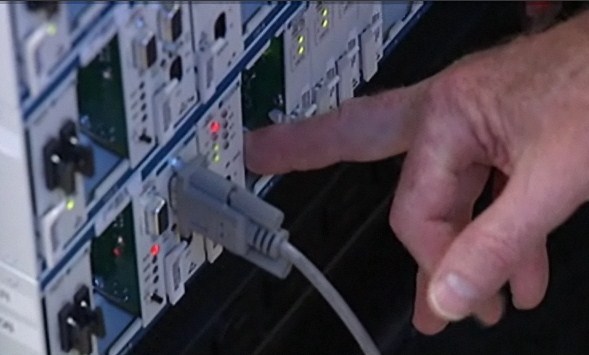Each time Frontier Communications gets mentioned on Stop the Cap!, we receive e-mail from disgruntled customers arriving to share their horror stories. Since Frontier has now absorbed Verizon landlines in several states, that e-mail is only increasing.
Because so many messages arrive on different topics, we’ll be trying to share your stories with our readers based on the types of problems experienced. Today, it’s the issue of refunds.
Stop the Cap! reader Alexia from Elk Grove, California writes:
Phillip, I want my money. For four months, I have called, written, and called again to ask where my refund check from Frontier is. We disconnected our service from Frontier back in May and our final bill had a credit of nearly $150 on our two landlines, DSL, and returned equipment. Why so much? Because we were quoted a final amount for our account and instead of using their auto-payment service, we mailed them a last check. They withdrew that amount electronically from our checking account anyway, so we had double payments.
This isn’t just me. My sister decided to disconnect her phone and will rely on her cell phone from now on, and she’s still waiting for her final credit balance to arrive back as well.
When you call Frontier, assuming you don’t get a busy signal or are left on hold, they seem very sympathetic and promise the refund has been processed and they are sending the check in the mail. The Pony Express could have gotten the check to us by now. My sister is waiting for $22 to be returned to her.
When I have canceled credit cards, utilities, and other services and have a credit balance, most of them include a check either in the final statement or in a letter that arrives within the month. Not Frontier. One representative claimed they don’t send refunds right away in case they discover additional charges they need to apply to an account. What charges? Are they hoping to find some? We have not made a long distance call on our landline in years since getting a cell phone and I cannot imagine what other charges they are talking about.
What is the story here?
Stop the Cap! reader Jeff in Elko, Nevada had a similar problem:
My job transferred me to Reno in July and we canceled our service with Frontier and are still waiting for our last bill refund because we had a credit balance. It was only around $8, but that was after I had to argue with them about a cancellation fee they tried to charge me and a fee for the DSL modem we returned to them. They credited our account for both after talking to a supervisor but now it is a waiting game for the final refund check to arrive. Every other company we canceled service with, right down to the propane people handled our final bill correctly. Not Frontier.
Since moving to Reno, we signed up for AT&T service which turned out to be way better than the DSL we had with Frontier that went offline nearly every afternoon, so we’re fine saying goodbye to them. Frontier has been in Elko for awhile now so I can only imagine what the Verizon customers are now dealing with.
In September, Frontier’s “the check is in the mail” excuse caught the attention of a Sacramento TV station’s consumer reporter.
Jeanne Pritchett Melendez of Elk Grove was also waiting for a refund check from Frontier for just over $15.
Back in May, Jeanne paid her Frontier phone bill ahead of time. And when she canceled her service mid-month, her bill was pro-rated and she was promised her money back. She called the company… Asking when her check would be sent. And every time, she says she was told, it’s on its way. But after more than three months…
“I was very frustrated and I said, you know what, if I don’t have a check in the mail by Friday, I’m going to call Kurtis [Ming – CBS13 Consumer Reporter],” says Jeanne.
Melendez got her refund before our readers did, along with an explanation from Frontier about why refunds take months to arrive:
Frontier Communications Statement:
Frontier’s refund process is to refund the final credit balance on disconnected accounts within 2 to 3 bill cycles from the disconnect date to allow time for any additional credits or charges that need to be applied to the account. This process is to ensure that the customer receives an accurate refund check.
The customer’s account reflects that the service was disconnected on May 13, 2010. The May 22nd , June 22nd and July 22nd bills reflected a credit balance in the amount of $15.03. A refund check in the amount of $15.03 was processed on the account on August 9th. The customer will receive the refund check within 10 to 14 business days to the address on record.
The representatives are trained to alert the customer that it can take 2-3 billing cycles which is usually between 30-60 days. However in the case of Ms. Melendez’s account the disconnect notice was so close to the bill date that three bill cycles were required to process the refund.
— Stephanie Beasly, Communications Manager
This isn’t the first time Kurtis Ming has had to approach Frontier Communications about Sacramento area residents’ frustrations with the company. Back in July, KOVR-TV ran a story about a Frontier customer who was paying a whopping $15 a month for Frontier’s Peace of Mind hard drive backup service he never got because he didn’t realize he had to download software to get the feature installed. While that was not Frontier’s fault (and the company provided a credit to the customer for the service he never used), charging $15 a month for a service other customers are paying less to receive isn’t exactly fair either.
[flv]http://www.phillipdampier.com/video/KOVR Sacramento Frontier Service Problems 7-7 and 9-17-10.flv[/flv]
KOVR-TV in Sacramento ran two segments on Elk Grove-area customers having problems with Frontier Communications — one waiting for a refund and the other charged for a service he didn’t realize he had. (4 minutes)


 Subscribe
Subscribe












